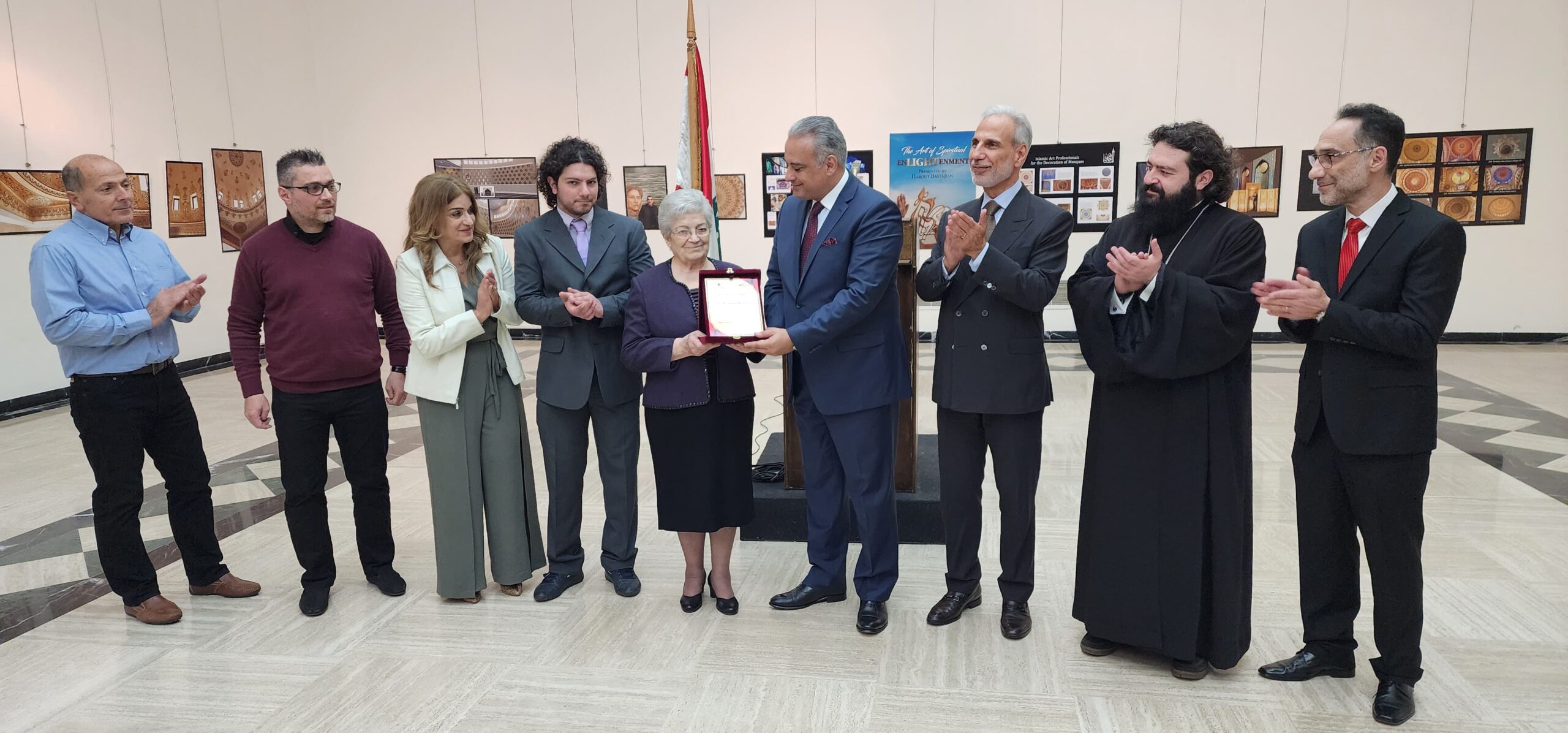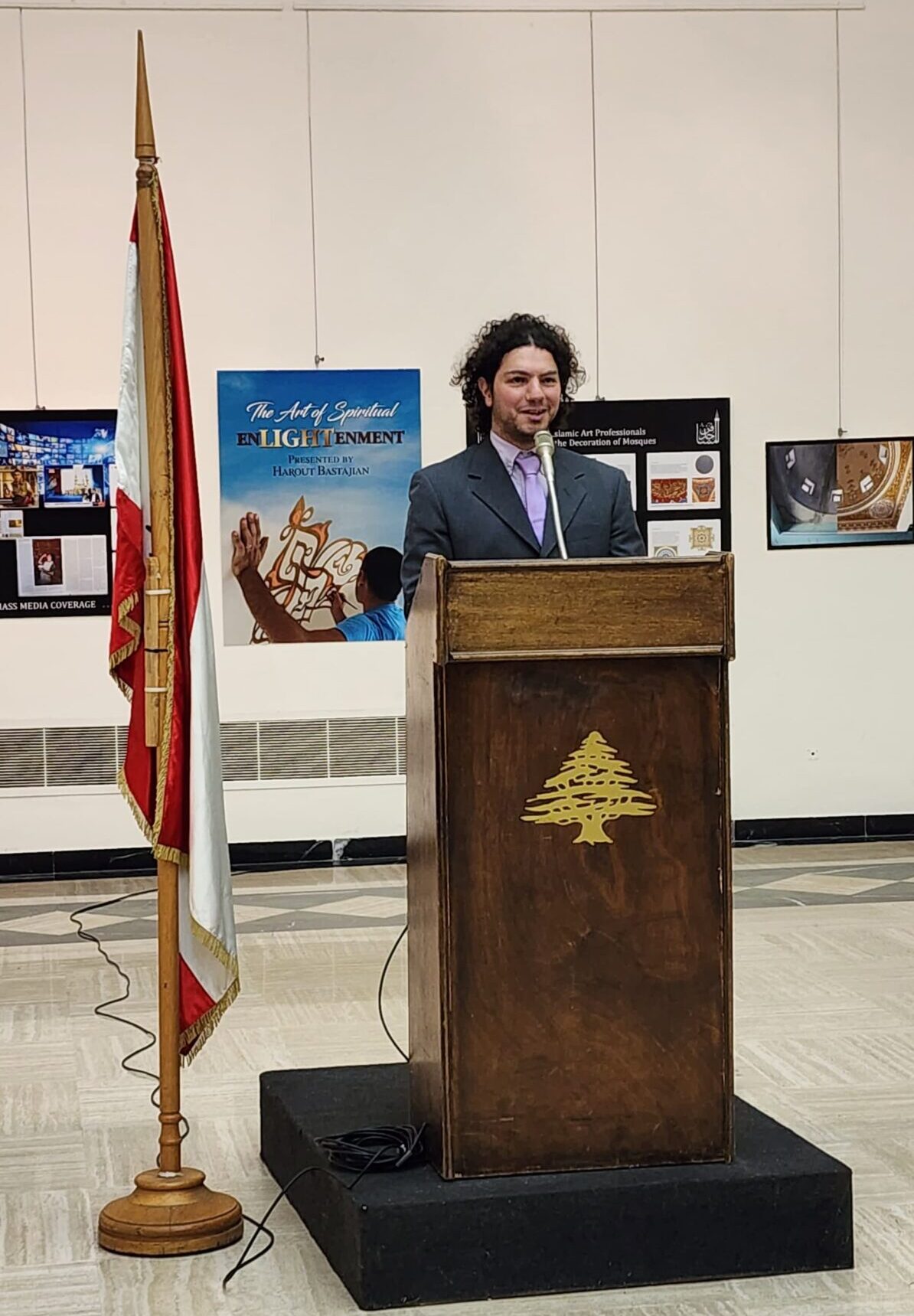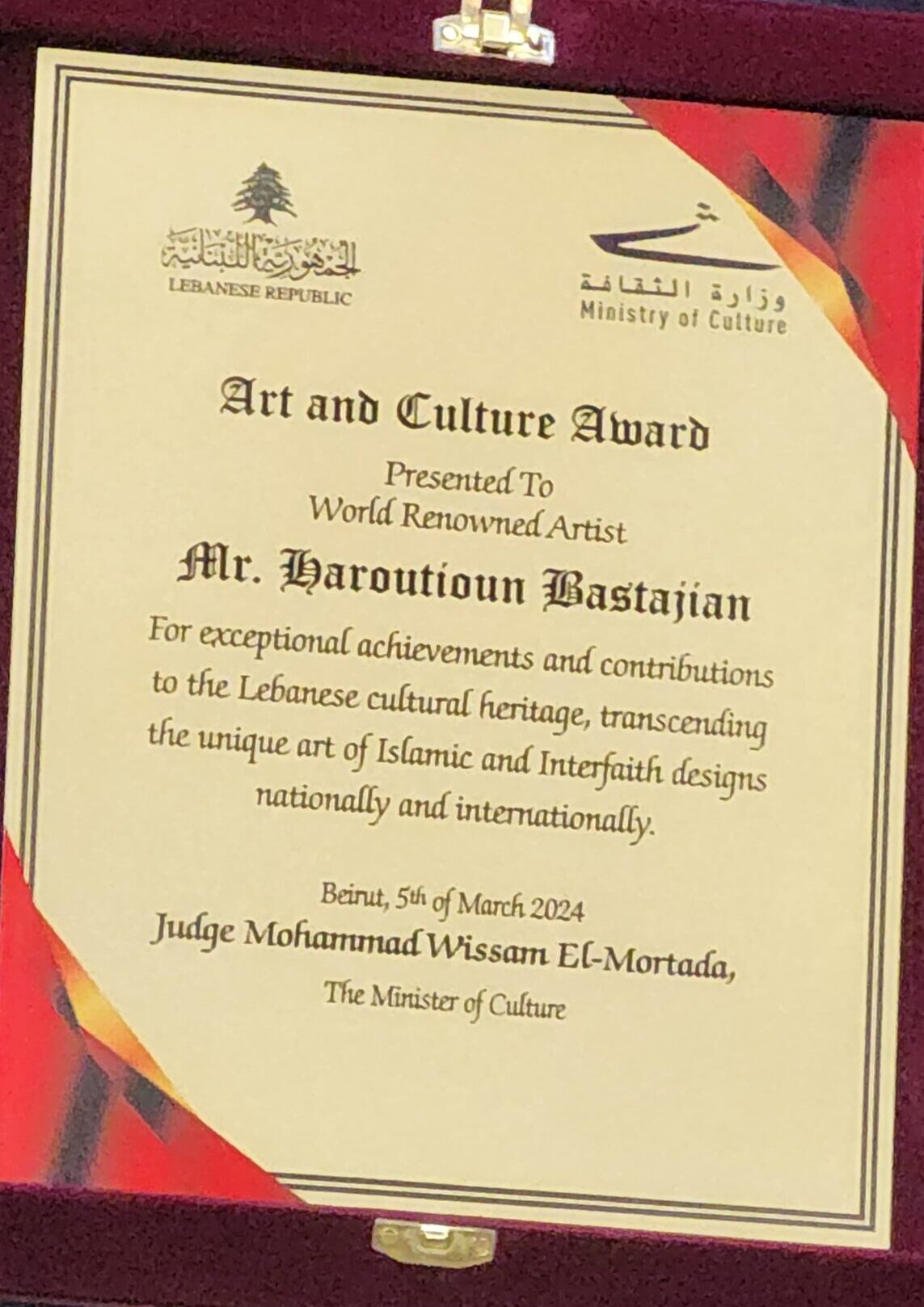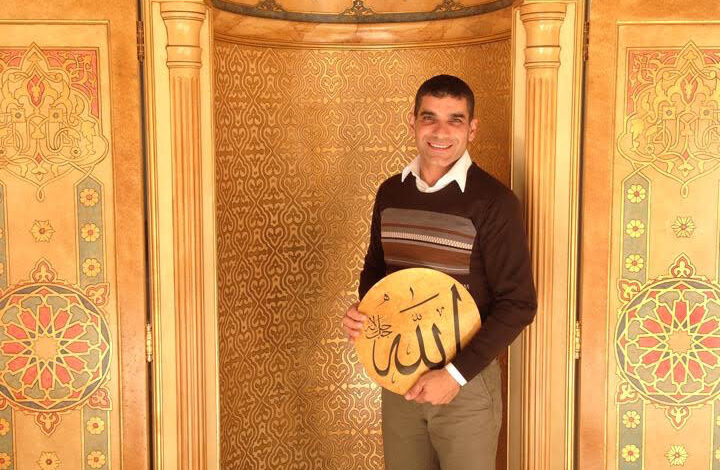DEARBORN — During an exhibition showcasing some of his work, international artist Haroutioun “Harout” Isack Bastajian was presented with the Art and Culture Award by the Lebanese Ministry of Culture.
The Lebanese artist of Armenian ethnicity decorated the interior of the Islamic Center of America prayer room and his artwork has spanned across several countries and places of worship.

Harout Bastajian’s mother, Mary, accepting the award on his behalf
“Lebanon is the most distinguished in the entire world,” Judge Muhammad Wissam Al-Murtada, the minister of culture in Lebanon, said. “And the spirit of its people has no equal in the entire world and is the product of the blessing of living that made an Armenian Christian named Haroutioun Bastajian an innovator of Islamic art as we are witnessing.”
The exhibition included pictures of Bastajian’s works from a number of mosques in Lebanon and other Arab and foreign countries.
“The first question that comes to mind is what makes a Lebanese of Armenian origin master this authentic Islamic art, just as the artist Mahmoud Al-Zabawi excelled in the field of icon painting in acquainting himself with the history of Christian art every year,” Al-Murtada said. “Harout’s creations make him worthy of the title Michelangelo of Mosques.”
As Bastajian was unable to attend the ceremony, his son Isaac delivered a speech on his behalf.

Isaac Bastajian giving a speech on his father’s behalf
“Thank you to everyone that allowed for the creation of such an event,” he said. “Thank you, your excellence the Minister of Culture Judge Mohammad Wissam Al-Murtada and his team. Thank you sir Raed (Sayed) Sharafeddine. A special thank you for the executing team that is always present on the ground in the execution of the projects, in Lebanon and outside of it, the soldiers on the ground. Thank you to my family members and in particular the hidden soldier, Zareh Bastajian, who’s always present behind the curtains.
“A big thank you to my wife (I mean my father’s wife, not mine), Alina Bastajian, who’s always been present with me in life and on the work field. Thank you to my dear country Lebanon. My father is a Lebanese warrior. His weapon of choice is the drawing brush. He’s shown Lebanon’s true image in its culture, its history, its acceptance of all communities and its communal life, and has spread that image across the countries of the world. A special message from my father to the youth of Lebanon: Despite all the hardships that the country is going through, take it as a blessing. Put your trust in God, put clear goals ahead of you, work in that direction and you will definitely succeed, head held high, and will be able to raise Lebanon’s name higher. I miss my country Lebanon. I love Lebanon.”
Al-Murtada said that Bastajian’s work shows that he is a blessing to Lebanon and reiterated that Lebanon is a blessing in itself.
“I would like to thank Sayyed Sharafeddine; you pointed out the obscure work of Harout Bastajian and brought it to light,” he said. “Despite all the hardship to the north, you showed the culture of Lebanon.”
He also said that they are proud of Bastajian and his work.
“It seems, Isaac, that your father is not only a great artist who knows how to care for the details in his art, it seems he’s also a great father who can raise capable people like yourself to represent him,” Al-Murtada said. “We are looking now at original Islamic art. Isaac has already mentioned that Lebanon is a blessing. There is nothing in Lebanon more beautiful than the country. The younger generation can attest to the blessing. There is nothing that looks like us. We are the children of blessing. These exceptional conditions grow us into exceptional beings. In thankfulness, blessing remains.
“You, the future generations that are passing through these difficulties, consider it a blessing since it is making you exceptional beings,” he added. “Lebanon is no hotel; it is a country that God blessed. Lebanon is the most exceptional place in the world and Lebanese people are the most exceptional people in the world. We are proud of Harout Bastajian and hope that he will be able to be here soon and join us in such exceptional projects and events.”
A priest from the Lebanese Armenian diocese, Fr. Barouyr Shernezian, said that seeing Bastajian’s art reminded him that they are people of Genocide and how the Armenian people watched their land and homes be destroyed and that in the face of such tragedies can learn to destroy or build.
“As Armenians, we learned to build,” he said. “We took Lebanon as a second home to us, and now it is a first home. We learned to build, and it didn’t matter where, in mosques or in churches. We witness here a beautiful art of color, and art is a universal language. It is a language of colors and drawings. The beautiful thing about the art of Harout Bastajian, is that the colors allow for players to look at it as a universal language. We see here a beautiful, prayerful art, created by an Armenian Christian, but an Islamic art nonetheless. And it shows Lebanon. Lebanon taught us tolerance, it teaches us acceptance, a big fabric of different cultures.
“We live in a country home for every religion,” he added. “Thank you to UNESCO for giving the opportunity to showcase this art in this beautiful ministerial palace, and recognize this living environment, the grace of love that Lebanon gives us to spread across the world to show the beauty of Lebanon. Lebanon might be known for a dark side sometimes, but here we can clearly see a beautiful, colorful image of what our country is.”

Art and Culture Award presented to Harout Bastajian
Bastajian told The Arab American News that he is humbled by this award but he couldn’t do it alone.
“This was the first time I got recognized by the Lebanese government for my art,” he said. “Frankly, I never searched for it and avoided it because of spiritual reasons. ‘I’m decorating the house of God (mosques/churches), it’s not fair to show off.’ It’s a good opportunity to be a role model for the young generation, especially in Lebanon, because they are suffering a lot because of war, financial crisis and lack of opportunities. I’m happy to receive the art and culture award from my country of origin, and I’m thankful for the help and support of everyone who helped me in my career, because it’s impossible to achieve it single handedly.”






Leave a Reply